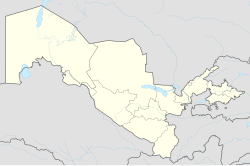Jizzakh
|
Jizzakh Jizzax / Жиззах |
|
|---|---|

The fountain at the main crossroads in downtown Jizzax, near Rashidov Square
|
|
| Location in Uzbekistan | |
| Coordinates: 40°06′57″N 67°50′32″E / 40.11583°N 67.84222°ECoordinates: 40°06′57″N 67°50′32″E / 40.11583°N 67.84222°E | |
| Country |
|
| Region | Jizzakh Region |
| First mention | 10th century |
| Government | |
| • Type | City Administration |
| Area | |
| • Total | 210 km2 (80 sq mi) |
| Elevation | 378 m (1,240 ft) |
| Population (2009) | |
| • Total | 148,850 |
| • Density | 710/km2 (1,800/sq mi) |
| Postal code | 130100-130117 |
| Area code(s) | (+998) 72 |
| Vehicle registration | 25-29 |
| Website | http://www.jizzax.uz/ (Uzbek) |
Jizzakh (Uzbek: Jizzax/Жиззах, جىززﻩخ; Russian: Джизак, Dzhizak/Džizak) is a city (population 138,400 in 2004) and the center of Jizzakh Region in Uzbekistan, northeast of Samarkand. The population of Jizzakh on April 24, 2014, was approximately 152,642.
Jizzakh was an important Silk Road junction on the road connecting Samarkand with Fergana Valley. It is at the edge of Golodnaya Steppe, and next to the strategic Pass of Jilanuti (Timur's Gate) in the Turkestan Mountains, controlling the approach to the Zeravshan Valley, Samarkand and Bukhara.
The name Jizzakh derives from the Sogdian word for "small fort" and the present city is built of the site of the town which belonged to Osrushana. After the Arab conquest of Sogdiana, Jizzakh served as a market town between the nomadic raiders and settled farmers. The Arabs built a series of rabats (blockhouses) at Jizzakh, housing ghazis to protect the people. By the 19th century, these blockhouses had evolved into a major fortress for the Emirate of Bukhara. Russian General Mikhail Chernyayev, the “Lion of Tashkent” failed in his first attempt to take Jizzakh, but succeed in his second try, with a loss of 6 men, against 6000 dead for the defenders. The old town was mostly destroyed, its remaining inhabitants evicted, and Russian settlers brought in.
In 1916, Jizzakh was the center of an anti-Russian uprising, which was quickly suppressed. In 1917, Jizzakh most famous native son, Sharof Rashidov, future secretary of the Communist Party of Uzbekistan, was born.
...
Wikipedia

